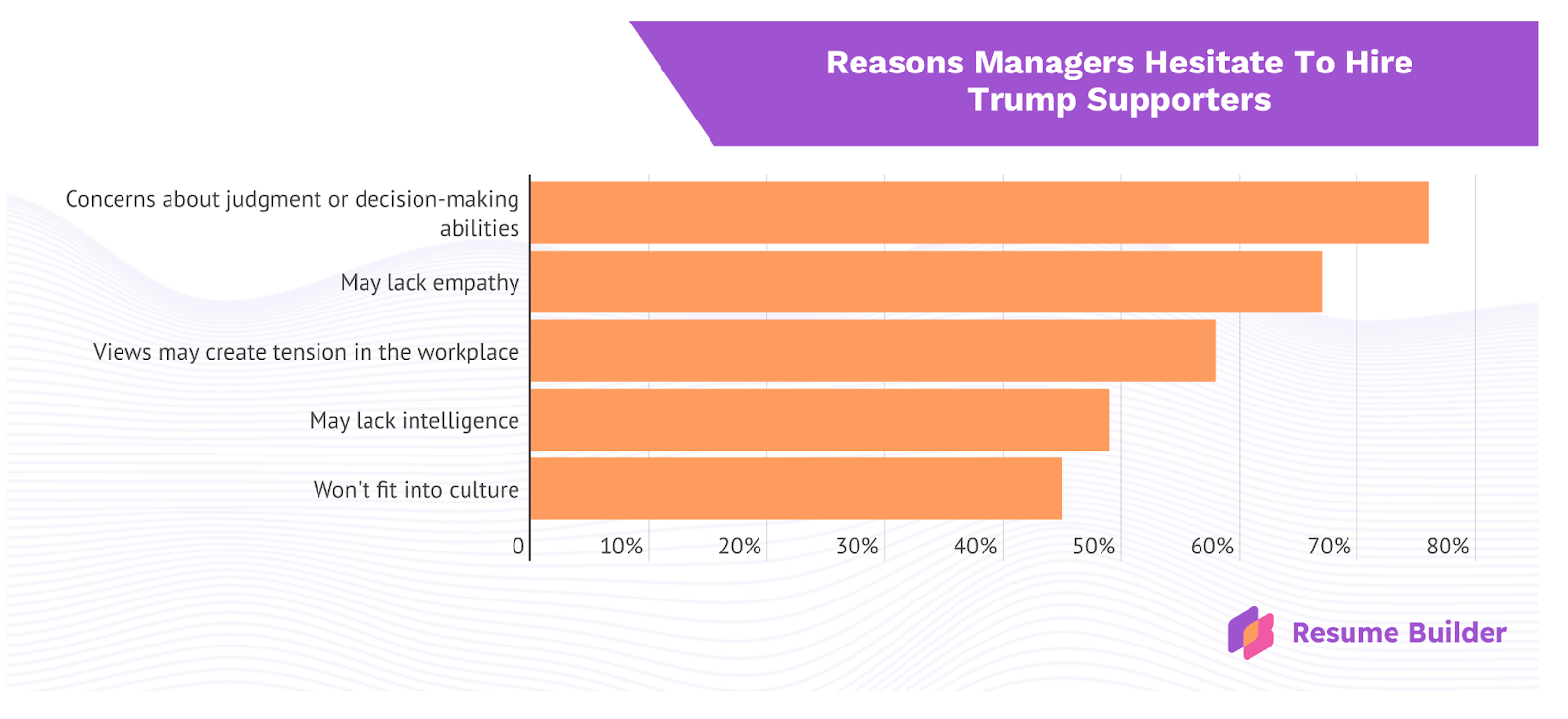Let’s talk about the elephant (pun absolutely intended) in the conference room: Trump supporters in the workplace. Because apparently, in 2024, your political views aren’t just about which box you check in the voting booth – they’re giving your boss some serious thoughts about your judgment. And honey, the data doesn’t lie.
According to a fresh-off-the-press ResumeBuilder.com survey, managers are side-eyeing Trump supporters harder than Karen watching teenagers at the mall. One in six managers straight-up says they’re less likely to hire Trump fans, and one in eight thinks twice about promotions. Yikes.
 The “But Why Though?” Breakdown
The “But Why Though?” Breakdown
Here’s the tea: When someone’s still riding the Trump train in 2024, managers aren’t just seeing political differences – they’re seeing red flags bigger than Trump’s ego (and that’s saying something).
“Managers cite concerns that supporting Trump signals poor decision-making skills, lack of empathy, and the potential to cause workplace conflicts.”
Soooo, unless you want decision-making skills that make Magic 8 Balls look reliable, rock-bottom empathy levels or drama to rival…well I guess the news right now, giving Trump voters a wide berth can seem like a manager’s best option.
The DEI Dilemma
Let’s keep it real: If your workplace is all about that DEI life (and in 2024, whose isn’t?), supporting certain… let’s call them “controversial” policies might be about as welcome as reply-all emails. Some managers are basically asking: Can someone who backs policies that make marginalized communities terrified for their future really create an inclusive workspace?
The Empathy Economy
In today’s workplace, empathy isn’t just a nice-to-have – it’s as essential as pretending to care about your coworker’s weekend stories. And if your political stance suggests you’ve got the emotional intelligence of a potato, well… that’s gonna be a problem. One thing no one has ever said about a Trump suporter is that they’re emotionally intelligent.
The Drama Factor
Look, workplace politics are messy enough without actual politics entering the chat. When someone’s political views put fellow workers in danger, it’s not just about different opinions – it’s about keeping the peace while Karen from Accounting and Bob from IT aren’t speaking because of whose flag is on whose desk.
Walking the Line
So how do companies handle this hot mess? It’s pretty delicate. I wish I had the right answer for you. At a minimum, companies need to:
- Get crystal clear about their values (and not in that corporate buzzword bingo way)
- Keep it professional by aligning actions to values when discussing incidents that arise.
- Foster conversations that don’t end in HR incidents….
Erm, that’s a tall order, which is probably why these managers decide to avoid it in the first place. Hiring someone with a MAGA hat in their profile pick, or a background in an organization that’s highly questionable just feels like you’re asking for trouble.
ResumeBuilder has a very HR-friendly view, saying:
“Managers must recognize that political beliefs, like any other personal characteristic, have no place in hiring decisions. This bias is no different from age, gender, or religion bias—yet the heightened political tensions in our country appear to have given rise to this form of discrimination.
Skills and abilities, such as decision-making and intelligence, can and should be evaluated directly through job performance or the hiring process—independent of any political affiliation. Removing political bias from decision-making is essential to maintaining fairness, fostering a respectful environment, and ensuring that workplace evaluations remain focused on professional competence and contributions.” – Stacie Haller, chief career advisor at Resume Builder.
To me, this represents an outdated “both sides” corporate approach that ignores an important distinction: Political views that directly correlate with workplace behavior and competency aren’t the same as irrelevant personal beliefs.
When managers observe that Trump supporters consistently demonstrate poor judgment, lack of empathy, and difficulty with factual reasoning in workplace situations, they’re not making unfair assumptions – they’re pattern-matching based on demonstrated behaviors. This is exactly what we ask managers to do when evaluating soft skills.
It also falsely equates political beliefs that fundamentally conflict with core workplace competencies (critical thinking, empathy, respect for diversity) with truly irrelevant personal factors like religious beliefs or hobbies. It’s like saying we shouldn’t judge an engineer’s technical abilities based on their belief that 2+2=5, because that’s just their “personal math philosophy.”
If someone’s political stance indicates they reject basic facts and struggle with empathy – two critical workplace skills – that’s relevant performance data, not bias.
While political beliefs alone should not be grounds for discrimination, when those beliefs consistently correlate with poor judgment, inability to process factual information, and behaviors that create a hostile work environment for marginalized colleagues, they become relevant workplace performance factors that managers have a responsibility to consider.
The Bottom Line
Here’s the situation, served straight up: While nobody’s saying you can’t love whoever you want politically (this isn’t a dystopian novel… yet), your choices have consequences. In the 2024 workplace, supporting certain political figures might just be the career equivalent of wearing Crocs to a job interview – technically allowed, but seriously, why would you?
Remember, folks: In the grand theater of workplace politics, sometimes the most professional thing you can do is keep your political jazz hands to yourself.


